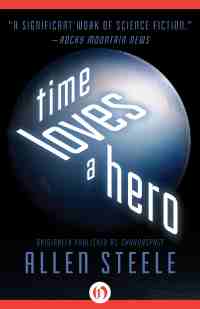Arkwright by Allen Steele
 Wednesday, April 6, 2016 at 10:00AM
Wednesday, April 6, 2016 at 10:00AM 
Published by Tor Books on March 1, 2016
I’ve never read a science fiction novel quite like Arkwright. It is a generational saga, but unlike most generational sagas, which follow a family from a century or two in the past to the present, this one follows a family from the past to the future.
Dying quietly in his own bed, Nathan Arkwright’s last words as his heart fails are “Forward the Legion.” Arkwright, creator of the Galaxy Patrol, was one of the most famous sf authors of the twentieth century. His granddaughter, Kate, barely knew him, but decides to attend his funeral, mostly to cheese off her mother. There she meets the other members of the Legion of Tomorrow.
From talking to the Legion members, Kate learns about her family history. The first part of Arkwright, in fact, reads more like a family drama/soap opera than a science fiction story. But part of that history belongs to Nathan Arkwright. In his prime, he was one of a select group of sf writers who imagined a future of space exploration and first contact. In the 1990s, he realized that fans wanted to read about cyberspace rather than outer space. His Galaxy Patrol books still sold (largely due to the success of Star Wars movies) but he no longer felt relevant. As a visionary who put his beliefs ahead of his personal wealth, Arkwright decided to use his Galaxy Patrol royalties to cement his relevance to the future of humanity.
The first part of Arkwright is great fun for science fiction fans. Fred Pohl, Isaac Asimov, Ray Bradbury, Arthur C. Clarke, Robert Heinlein, and other notable sf writers of that era make cameo appearances. Snippets of science fiction history inspire part of the plot. Fans of the genre who are familiar with the giants of the past will get a kick out of seeing the legends as characters in Allen Steele’s novel.
The next several sections follow new generations of the Arkwright family as they give effect to Nathan’s vision: to seed another planet with human life. Readers who think that science fiction should follow the stereotypes of science fiction (and those who refuse to read anything other than science fiction) will probably be turned off by Steele’s reliance on family drama to carry the novel’s middle sections. I wouldn’t say the succession of family dramas in the middle chapters are entirely successful -- they are certainly less compelling than the beginning -- but I found the characters to be reasonably interesting, if a bit shallow.
The last section takes place several generations in the future when, as has often been true in history, a group of humans have allowed religious dogma to supplant science and reason. I won’t talk about what happens, but I will say that the novel’s conclusion circles back as a tribute to the science fiction visionaries of the past. That makes Arkwright a satisfying read, at least for readers (like me) who grew up reading optimistic novels of the future, novels that viewed humans as capable of overcoming their narrow prejudices and shortsightedness, novels that viewed science and exploration as the path to a better tomorrow.
RECOMMENDED
